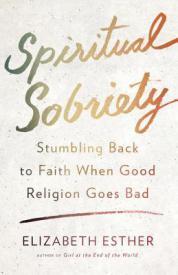I can’t trust my heart: the case for spiritual autonomy
I am so grateful for Christians like Elizabeth Esther who are dedicated to exposing the underbelly of spiritual abuse in many fundamentalist churches, as well as offering wisdom to people struggling with their faith after they escape. Spiritual Sobriety is one of a few books on self care after being hurt by a toxic faith environment. Others I’ve read recently are Faith Shift by Kathy Escobar and The Sin of Certainty by Peter Enns.
 There’s a market for people bruised by faith communities I had no idea was out there. I’m so thankful for that; for proof that I am not alone in the struggle to recover the goodness of God that, at one point, turned my life upside down in the best possible way. I believe recovery is possible, but the road to healing is hard. It’s hard because of the reminder from small groups, Bible studies, and sermons over the years that my heart is wicked and deceitful, and therefore I cannot trust it.
There’s a market for people bruised by faith communities I had no idea was out there. I’m so thankful for that; for proof that I am not alone in the struggle to recover the goodness of God that, at one point, turned my life upside down in the best possible way. I believe recovery is possible, but the road to healing is hard. It’s hard because of the reminder from small groups, Bible studies, and sermons over the years that my heart is wicked and deceitful, and therefore I cannot trust it.
This idea comes from Jeremiah 17:9: “The heart is deceitful above all things.” A similar sentiment is found in Judges 17:6: “In those days Israel had no king; all the people did whatever seemed right in their own eyes.” In a recent blog post for Focus on the Family, an organization whose worldview closely aligns with that of my former college ministry, Adam Holz writes:
We live in a time that says feeling good on our own terms is what matters most. But it’s a false gospel. And a dangerous one, too. Because as much as I don’t like to admit it, my strong feelings aren’t always right, aren’t always aligned with truth. Only as I take those strong emotions to God, submit them to Him, and ask Him to work in and through me as I seek to follow Him are my feelings likely to be reflective of that truth.
No, our strong feelings aren’t always right. Our feelings can cause us to believe things about ourselves that are harmful and untrue. But feelings should not be ignored altogether. For those with anxiety and panic disorders, ignoring our feelings is extremely problematic. If I’m sitting in church listening to a sermon that triggers anxiety, it’s not healthy for me to stay. Stomach pains and diarrhea from being triggered are not healthy.
One of the best decisions I made for my faith recently was to stop attending services at the church where I had an anxiety attack, and sit outside the sanctuary in the lobby area with my Bible and prayer journal while my husband worships there. I’m not without community, either, because after church we join our friends from small group for lunch. In addition, I attend a weekly Bible study with the same group. This is one example of when listening to my feelings was a very good decision.
Both Esther and Escobar recommend taking breaks from reading Scripture or attending church if it’s just too stressful at the moment. They aren’t saying we should quit either one, just take a break – but I imagine that Christians like Holz would call that suggestion blasphemous. Christians like Holz may feel “convicted” to tell me I’m wrong in pursuing this track toward healing. But according to his own theology, Holz’s heart can’t be trusted, either. He knows what’s best for my spiritual life way less than I do.
In both ministry and in seminary, faith was not supposed to be messy or gray. There was only right and wrong, no in between, and putting down your Bible or skipping church was just not okay. I was inexplicably taught that I could never know what’s best for me, because my selfish heart was only interested in instant gratification. Apparently, only spiritual mentors of whom I was a sort of disciple could know. And somehow, the deceitfulness of their hearts was not an issue when taking their advice.
I wouldn’t call either group a cult, but both had explicitly abusive tendencies that I could not recognize at the time. Only after I left was I able to recognize the red flags. And you know what? I owe my life to self-care. Once I started believing that I was worthy of a safe space to worship and grow, everything started to change. I still struggle with feeling that I don’t deserve anything good, but I’m not as deep in the hole as I used to be.
While it’s generally a good idea to discuss important decisions with people who are close to you, spiritual autonomy cannot be dismissed. This does not mean worshiping in a vacuum, isolated in a cave somewhere. It means trusting the reason that God gave you when something feels “off,” because doing so could just save your faith…if not your life.
Filed under: Religion Tagged: Campus Crusade for Christ, Christian culture, Christianity, depression, evangelicals, grief, self-care, Seminary, Spiritual Abuse











